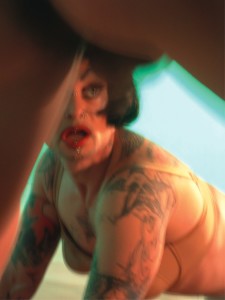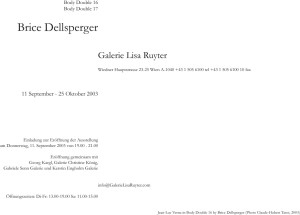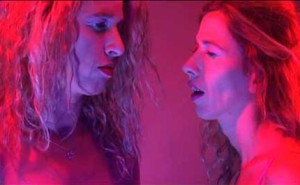Brice Dellsperger
September 11- October 25, 2003
Opens September 11, 19.00 – 21.00
“Body Double 16” 2003, starring Jean-Luc Verna. Duration: 6.24 minutes
“Body Double 17” 2001, starring Gwen Roch and Morgane Rousseau. Duration: 16.27 minutes
Galerie Lisa Ruyter will open its doors to the public for the first time by presenting a show of video works by Brice Dellsperger from the 11th of September through the 25th of October, 2003.
Two pieces will be screened one after the other for the duration of the exhibition. “Body Double 17” from 2001, is a remake of the roadhouse scene from David Lynch’s “Twin Peaks: Fire Walk With Me.” In “Body Double 17” all of the roles are played by sisters, who are not twins but who do in fact look very much alike. “Body Double 16” from this year, puts a lesser known scene of Stanley Kubrick’s very famous 1971 film “A Clockwork Orange” with the very famous naked wrestling scene from Ken Russell’s not-as-famous 1969 film “Women in Love” (Both films, by the way, were banned in England for their content.)
Two of Dellsperger’s primary themes are that of the Body and that of the Double.
To understand Brice Dellsperger’s project a little better, begin by looking at the artist’s use of the name “Body Double” to title all of his films. The name, borrowed from the 1984 feature by Brian De Palma, is also a film production term. A ‘body double’ is a person who stands in for an actor to perform certain types of scenes or to facilitate special effects. Dellsperger points out that it is an individual who takes the place of a famous person, in fact, he even describes himself as a body double for a director.
Dellsperger thinks of his project as an attempt to break down the hierarchical structures of mainstream filmmaking and its attendant star machinery. His productions are shot on digital video, and edited on his home computer. These remakes usually star only one or two people who play every character on screen, lip-synching with the original soundtrack. The collaging of separate pieces of footage of the same person creates slippages that are not unlike Andy Warhol’s mis-registrations. These are often ghost-like and expressive. Brice is at heart a pop artist and his project is intrinsically linked to confusions and appropriations of popular style, consumable culture and celebrity.
The star of “Body Double 16” is artist Jean-Luc Verna, who has a very large, very tattooed and pierced body. He is also the star of Dellsperger’s full-length masterwork “Body Double X,” a remake of Andrzej Zulawski’s 1975 melodrama “The Important Thing Is To Love.” When he stars in Dellsperger’s work, he plays every character on screen, styled and dressed as a transvestite. This creates a replacement for a body, outlined by gender. The viewer is forced to use alternative skills in the act of identification, of naming, just to hold onto the narrative structure of the piece.
Dellsperger’s pieces are numbered upon conception of the piece rather than on completion. The pieces often have a personal agenda at their conception, but the many acts of doubling in their execution often results in negating this along with the agendas of the original film. What are left are the slippages, the reversals and the outlined ideas, through which connections are made – physical, emotional and cultural. These become more important than any notion of an “original,” and therefore superior– text, body, work or idea.
The gallery is owned and operated by painter Lisa Ruyter. We are happy to introduce the director of the gallery, Andreas Fischbacher, who has been an invaluable help from the very beginning of the project. Galerie Lisa Ruyter will open at the same time as a solo show of new works by Ms. Ruyter at Georg Kargl, just around the corner on Schleifmühlgasse.


